Unit 4 Adversity and Courage Discover useful structure 课件(26张)人教版(2019)选择性必修 第三册
文档属性
| 名称 | Unit 4 Adversity and Courage Discover useful structure 课件(26张)人教版(2019)选择性必修 第三册 | 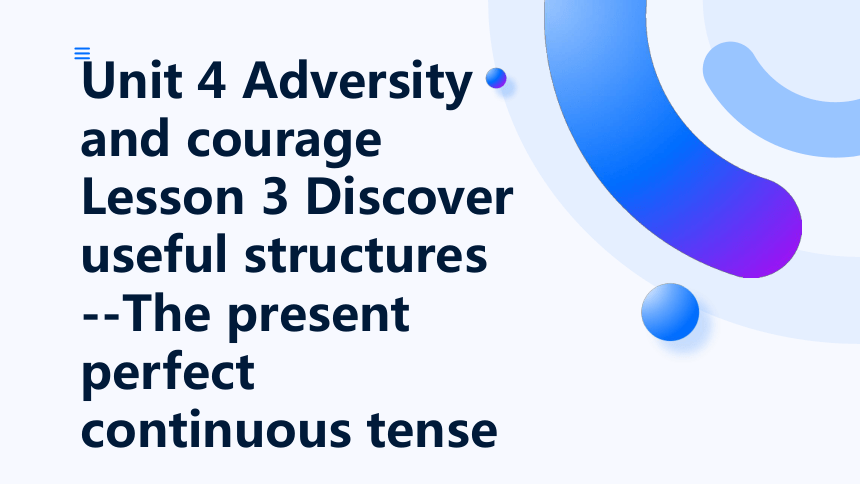 | |
| 格式 | pptx | ||
| 文件大小 | 3.7MB | ||
| 资源类型 | 教案 | ||
| 版本资源 | 人教版(2019) | ||
| 科目 | 英语 | ||
| 更新时间 | 2025-03-05 09:32:32 | ||
图片预览

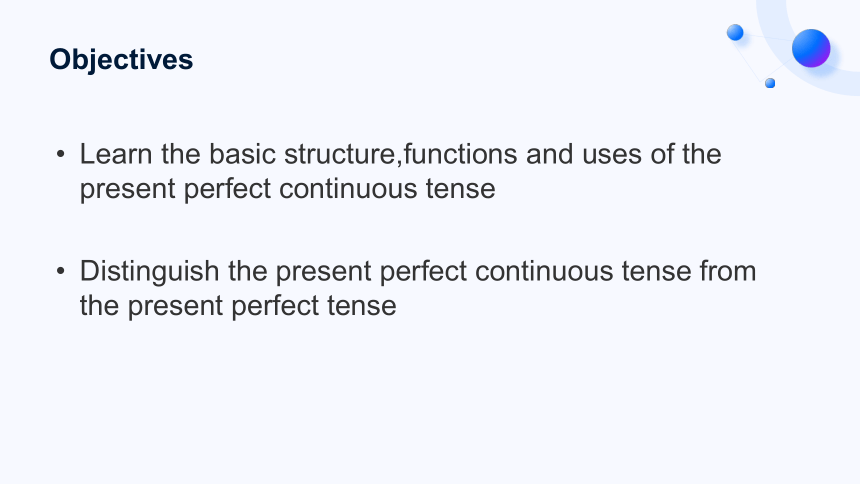

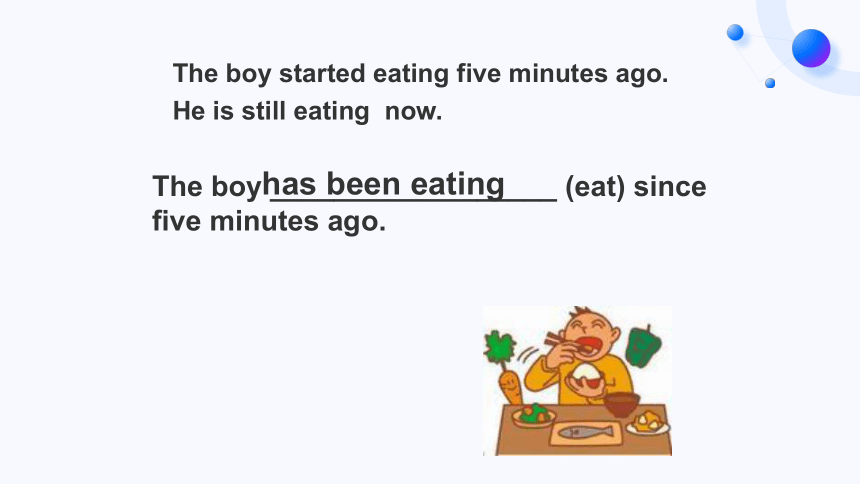
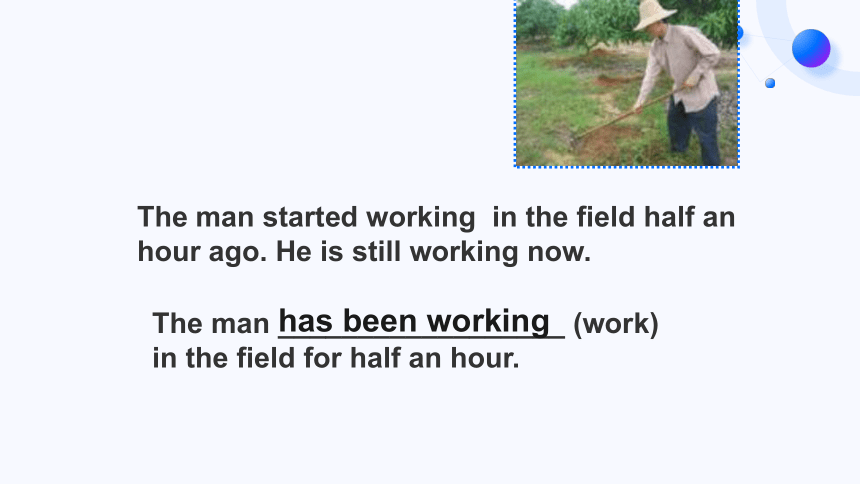

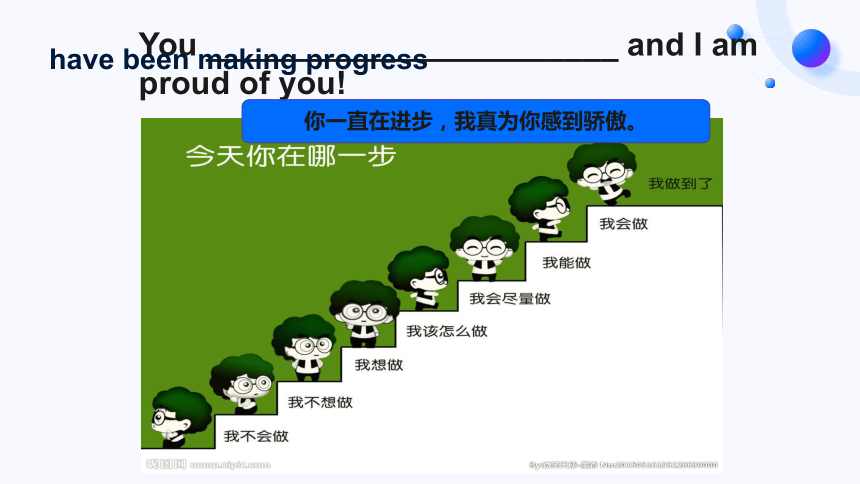


文档简介
(共26张PPT)
Unit 4 Adversity and courage
Lesson 3 Discover useful structures
--The present perfect continuous tense
Objectives
Learn the basic structure,functions and uses of the present perfect continuous tense
Distinguish the present perfect continuous tense from the present perfect tense
P38 ...this is the adventure that I have been dreaming of.
P38 We are now camped on the ice and we have been managing to survive.
P39 We have been struggling for days,...
The boy __________________ (eat) since five minutes ago.
has been eating
The boy started eating five minutes ago.
He is still eating now.
The man __________________ (work) in the field for half an hour.
has been working
The man started working in the field half an hour ago. He is still working now.
我从八岁起就开始学英语了,现在仍然很爱它。
I __________________ English since I was 8 years old and I still love it.
have been learning
You _______________________ and I am proud of you!
你一直在进步,我真为你感到骄傲。
have been making progress
The little boy _________________ to be attentive, but can’t help falling asleep.
has been struggling
小朋友一直努力在集中注意力,但还是情不自禁睡着了。
这些天一直在下雨。
has been raining
It ___________________ these days.
4. You have been making progress and I am proud of you!
5. The little boy has been struggling to be attentive, but can’t help falling asleep.
6. It has been raining these days.
1.The boy has been eating since five minutes ago.
2.The man has been working in the field for half an hour.
3. I have been learning English since I was 8 years old and I still love it.
S(主语)+has/have been doing
现在完成进行时
现在完成进行时表示动作从过去某一时间开始,一直持续到现在,或者刚刚终止,或者可能还要继续进行下去。
定义
4. You have been making progress and I am proud of you!
5. The little boy has been struggling to be attentive, but can’t help falling asleep.
6. It has been raining these days.
1.The boy has been eating since five minutes ago.
2.The man has been working in the field for half an hour.
3. I have been learning English since I was 8 years old and I still love it.
learn
8 years ago
future
now
learn
learn
He has been learning English since he was 8 years old and he still loves it.
表示动作从过去某时开始一直到说话时还在进行或可能还要继续下去。
现在完成进行时的用法1
与现在完成进行时连用的时间状语: all day/month; this month/week/year; these days; recently/lately; in the past/last few+时间段; since+时间点; for+时间段, ever since等。
He has been working all day.
They have been building the bridge for two months.
The two parties have been trying to unite since the New Year.
e.g.:
How everyone will envy me when I tell them I am admitted to the university I have been dreaming of.
1. A: I am sorry I have kept you waiting so long.
B: It is all right. I have been reading the
newspapers.
2. We have been waiting for you for half an hour.
3. Her eyes are red. It's obvious that she has been crying for a long time.
2.表示不久前刚刚结束的动作。这种意义通常根据上下文来判断。
现在完成进行时的用法2
现在完成进行时的用法3
1. It has been raining these days.
2. We have been practicing Kung Fu recently.
3. I have been visiting some cities of China
this month.
3.表示在一段持续的时间内动作的多次重复,而这个重复的动作在说话时并不一定在进行。
Why are you late again I have been waiting for you for two hours.
1. You have been making progress and I am proud of you!
4.表示某种强烈的感彩,如:赞赏、批评、愤怒等。
现在完成进行时的用法4
相同点:
1. 动作都发生在过去
2. 都与一段时间连用
现在完成时和
现在完成进行时的比较
Li Jia __________ (read) a book about psychology. (She finished reading the book.)
Li Jia ______________ (read) a book about psychology. (She is still reading the book.)
has read
has been reading
比较一:
past
future
now
read
do
have read
past
future
now
read
do
have been reading
do
现在完成时
现在完成进行时
动作刚结束;
强调对现在的影响或结果
动作还在延续;
强调动作的延续性
Have you been meeting him recently
你最近经常见到他吗?
Have you met him recently
你最近见过他吗?
The teacher has been telling us to be careful all the term.
整个学期,老师一直在告诉我们要细心。
The teacher has told us to be careful all the term.
老师告诉我们整个学期都要细心。
现在完成进行时可以表示动作的重复;
现在完成时一般不表示动作的重复
比较二:(1)
A. — _____________ have you visited Egypt this month
— I have visited Egypt twice this month.
(过去往返埃及和居住地, 但现在已回来)
B. — __________ have you been touring Egypt
— I have been touring Egypt for two month.
(过去一段时间一直待在埃及, 没有离开过)
How many times
How long
Tip 2:现在完成时表示已完成的动作,提问时用how many times。而现在完成进行时,表示持续的、不间断的动作,提问时用how long。
比较二:(2)
Tip 3:现在完成进行时比较生动,有时含有明显的感彩(喜悦、愤怒、不满、厌恶等。),而现在完成时往往只说明一个事实,一种影响或结果。
试比较:
I have waited for you for two hours.
I have been waiting for you for two hours.
说一个事实;平铺直叙
强调动作的持续性或不满意
比较三:
下列句型中常用现在完成时
It is (has been) +一段时间+ since +从句
This (that/ It ) is the first (second…) time that + 完成时
This (That/ It) is the best/ finest / most interesting….+that+完成时
It’s/ It has been 3 years since they got married.
It’s the first time that I have been to the Great Wall.
This is the most interesting film that I have seen.
比较四:(1)
They have known each other since 1970.
(1)有些表示状态、感情、感觉的动词如:
① 表示感官、感觉:see, hear, smell 等;
② 表示爱憎:love, prefer, mind 等;
③ 表示希望、意愿:wish, want, desire 等;
④ 表示相信、猜想:believe, think, suppose 等;
不能用于现在完成进行时,但可用于现在完成时。
John has loved Mary since ten years ago.
比较四:(2)
Summary
Basic structure,and uses of the present perfect continuous tense.
S(主语)+has/have been doing
1.表示动作从过去某时开始一直到说话时还在进行或可能还要继续下去。
2.表示不久前刚刚结束的动作。这种意义通常根据上下文来判断。
3.表示在一段持续的时间内动作的多次重复,而这个重复的动作在说话时并不一定在进行。
4.表示某种强烈的感彩,如:赞赏、批评、愤怒等。
Unit 4 Adversity and courage
Lesson 3 Discover useful structures
--The present perfect continuous tense
Objectives
Learn the basic structure,functions and uses of the present perfect continuous tense
Distinguish the present perfect continuous tense from the present perfect tense
P38 ...this is the adventure that I have been dreaming of.
P38 We are now camped on the ice and we have been managing to survive.
P39 We have been struggling for days,...
The boy __________________ (eat) since five minutes ago.
has been eating
The boy started eating five minutes ago.
He is still eating now.
The man __________________ (work) in the field for half an hour.
has been working
The man started working in the field half an hour ago. He is still working now.
我从八岁起就开始学英语了,现在仍然很爱它。
I __________________ English since I was 8 years old and I still love it.
have been learning
You _______________________ and I am proud of you!
你一直在进步,我真为你感到骄傲。
have been making progress
The little boy _________________ to be attentive, but can’t help falling asleep.
has been struggling
小朋友一直努力在集中注意力,但还是情不自禁睡着了。
这些天一直在下雨。
has been raining
It ___________________ these days.
4. You have been making progress and I am proud of you!
5. The little boy has been struggling to be attentive, but can’t help falling asleep.
6. It has been raining these days.
1.The boy has been eating since five minutes ago.
2.The man has been working in the field for half an hour.
3. I have been learning English since I was 8 years old and I still love it.
S(主语)+has/have been doing
现在完成进行时
现在完成进行时表示动作从过去某一时间开始,一直持续到现在,或者刚刚终止,或者可能还要继续进行下去。
定义
4. You have been making progress and I am proud of you!
5. The little boy has been struggling to be attentive, but can’t help falling asleep.
6. It has been raining these days.
1.The boy has been eating since five minutes ago.
2.The man has been working in the field for half an hour.
3. I have been learning English since I was 8 years old and I still love it.
learn
8 years ago
future
now
learn
learn
He has been learning English since he was 8 years old and he still loves it.
表示动作从过去某时开始一直到说话时还在进行或可能还要继续下去。
现在完成进行时的用法1
与现在完成进行时连用的时间状语: all day/month; this month/week/year; these days; recently/lately; in the past/last few+时间段; since+时间点; for+时间段, ever since等。
He has been working all day.
They have been building the bridge for two months.
The two parties have been trying to unite since the New Year.
e.g.:
How everyone will envy me when I tell them I am admitted to the university I have been dreaming of.
1. A: I am sorry I have kept you waiting so long.
B: It is all right. I have been reading the
newspapers.
2. We have been waiting for you for half an hour.
3. Her eyes are red. It's obvious that she has been crying for a long time.
2.表示不久前刚刚结束的动作。这种意义通常根据上下文来判断。
现在完成进行时的用法2
现在完成进行时的用法3
1. It has been raining these days.
2. We have been practicing Kung Fu recently.
3. I have been visiting some cities of China
this month.
3.表示在一段持续的时间内动作的多次重复,而这个重复的动作在说话时并不一定在进行。
Why are you late again I have been waiting for you for two hours.
1. You have been making progress and I am proud of you!
4.表示某种强烈的感彩,如:赞赏、批评、愤怒等。
现在完成进行时的用法4
相同点:
1. 动作都发生在过去
2. 都与一段时间连用
现在完成时和
现在完成进行时的比较
Li Jia __________ (read) a book about psychology. (She finished reading the book.)
Li Jia ______________ (read) a book about psychology. (She is still reading the book.)
has read
has been reading
比较一:
past
future
now
read
do
have read
past
future
now
read
do
have been reading
do
现在完成时
现在完成进行时
动作刚结束;
强调对现在的影响或结果
动作还在延续;
强调动作的延续性
Have you been meeting him recently
你最近经常见到他吗?
Have you met him recently
你最近见过他吗?
The teacher has been telling us to be careful all the term.
整个学期,老师一直在告诉我们要细心。
The teacher has told us to be careful all the term.
老师告诉我们整个学期都要细心。
现在完成进行时可以表示动作的重复;
现在完成时一般不表示动作的重复
比较二:(1)
A. — _____________ have you visited Egypt this month
— I have visited Egypt twice this month.
(过去往返埃及和居住地, 但现在已回来)
B. — __________ have you been touring Egypt
— I have been touring Egypt for two month.
(过去一段时间一直待在埃及, 没有离开过)
How many times
How long
Tip 2:现在完成时表示已完成的动作,提问时用how many times。而现在完成进行时,表示持续的、不间断的动作,提问时用how long。
比较二:(2)
Tip 3:现在完成进行时比较生动,有时含有明显的感彩(喜悦、愤怒、不满、厌恶等。),而现在完成时往往只说明一个事实,一种影响或结果。
试比较:
I have waited for you for two hours.
I have been waiting for you for two hours.
说一个事实;平铺直叙
强调动作的持续性或不满意
比较三:
下列句型中常用现在完成时
It is (has been) +一段时间+ since +从句
This (that/ It ) is the first (second…) time that + 完成时
This (That/ It) is the best/ finest / most interesting….+that+完成时
It’s/ It has been 3 years since they got married.
It’s the first time that I have been to the Great Wall.
This is the most interesting film that I have seen.
比较四:(1)
They have known each other since 1970.
(1)有些表示状态、感情、感觉的动词如:
① 表示感官、感觉:see, hear, smell 等;
② 表示爱憎:love, prefer, mind 等;
③ 表示希望、意愿:wish, want, desire 等;
④ 表示相信、猜想:believe, think, suppose 等;
不能用于现在完成进行时,但可用于现在完成时。
John has loved Mary since ten years ago.
比较四:(2)
Summary
Basic structure,and uses of the present perfect continuous tense.
S(主语)+has/have been doing
1.表示动作从过去某时开始一直到说话时还在进行或可能还要继续下去。
2.表示不久前刚刚结束的动作。这种意义通常根据上下文来判断。
3.表示在一段持续的时间内动作的多次重复,而这个重复的动作在说话时并不一定在进行。
4.表示某种强烈的感彩,如:赞赏、批评、愤怒等。
